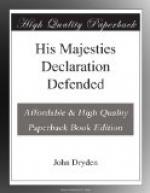by the known honesty of another Evidence: but
if he be condemn’d, let us see what truth will
come out of him, when he has
Tyburn and another
World before his Eyes. Then, if he confess any
thing which makes against the Cause, their Excuse
is ready; he died a Papist, and had a dispensation
from the Pope to lie. But if they can bring him
silent to the Gallows, all their favour will be, to
wish him dispatch’d out of his pain, as soon
as possibly he may. And in that Case they have
already promis’d they will be good to his Wife,
and provide for her, which would be a strong encouragement,
for many a woman, to perswade her Husband to digest
the Halter. This remembers me of a certain Spanish
Duke, who commanding a Sea-Port-Town, set an Officer
of his, underhand to rob the Merchants. His Grace
you may be confident was to have the Booty, and the
Fellow was assur’d if he were taken to be protected.
It fell out, after some time, that he was apprehended:
His Master, according to Articles, brought him off.
The Rogue went again to his vocation, was the second
time taken, delivered again, and so the third.
At last the matter grew so notorious, that the Duke
found, it would be both scandalous and difficult to
protect him any longer; But the poor Malefactor sending
his Wife to tell him that if he did not save him he
must be hanged to morrow, and that he must confess
who set him on: His Master very civilly sent
him this Message;
Prithee suffer thy self to be
hanged this once to do me a Courtesie, and it shall
be the better for thy Wife and Children.
’But that which makes amends for all, says our
Author, is the Kings resolution to have frequent Parliaments.
Yet this, it seems, is no amends neither: for
he says Parliaments are like Terms, if there be Ten
in a Year, and all so short to near no Causes, they
do no good.’
I say on the other hand, If the Courts will resolve
beforehand to have no Causes brought before them,
but one which they know they cannot dispatch; let
the Terms be never so long, they make them as insignificant
as a Vacation.
The Kings Prerogative, when and where they should
be call’d, and how long they should sit, is
but subservient, as our Friend tells us, to the great
design of Government; and must be accommodated to it,
or we are either denyed or deluded of that Protection
and Justice we are born to.
My Author is the happiest in one faculty, I ever knew.
He is still advancing some new Position, which without
proving, he slurs upon us for an Argument: though
he knows, that Doctrines without proofs will edifie
but little. That the Kings Prerogative is subservient,
or in order to the ends of Government is granted him.
But what strange kind of Argument is this, to prove
that we are cheated of that Protection to which we
are born. Our Kings have always been indued with
the power of calling Parliaments, nominating the time,
appointing of the Place, and Dissolving them when




